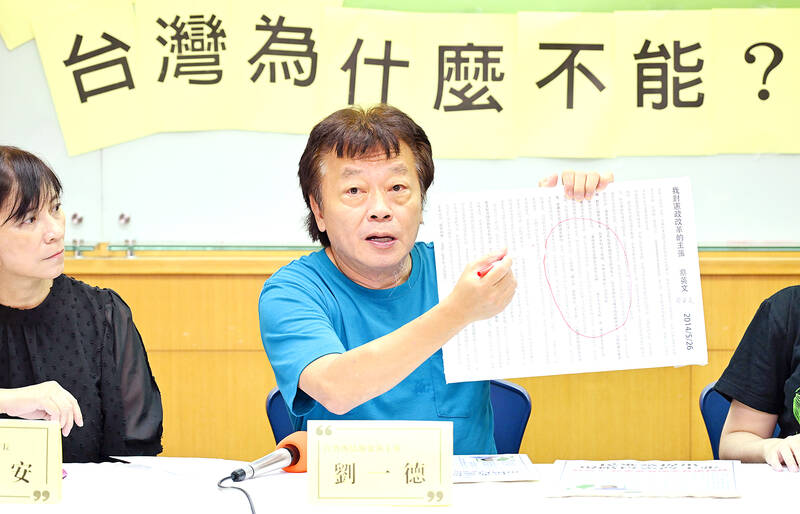Leaders of the Taiwan Solidarity Union (TSU) and Green Party Taiwan have asked President Tsai Ing-wen (蔡英文) to implement reforms as promised to lower the electoral threshold, saying that small parties are being crowded out of existence.
The thresholds in the upcoming election are too high, TSU Chairman Liu Yi-te (劉一德) said, adding that a party must receive at least 5 percent of ballots to be granted legislator-at-large seats and 3 percent of the party-vote ballots to receive a state subsidy of NT$50 per vote.
The Democratic Progressive Party (DPP) and the Chinese Nationalist Party (KMT) have “reaped millions from the national treasury,” Liu said.

Photo: Liao Chen-huei, Taipei Times
The DPP and the KMT have dominated the nation’s political landscape and received state financing and vote subsidies, he said, adding that only in recent years has the rise of the New Power Party (NPP) and the Taiwan People’s Party (TPP) ended the duopoly.
Meanwhile, smaller parties are being crowded out, and can no longer receive state subsidies, Liu said.
TSU Secretary-General and former legislator Chou Ni-an (周倪安) said that the high threshold has denied smaller parties’ legislator-at-large representation in the Legislative Yuan.
If the situation persists, there would be no checks-and-balance mechanism overseeing Taiwan’s two major parties, and no scrutiny against corruption and influence peddling by legislators and officials, Chou added.
Green Party Secretary-General Wang Yen-han (王彥涵) said that increasingly more people have negative feelings toward the DPP and the KMT, and they should be provided with a chance to vote for other parties.
However, as they are concerned with not exceeding the threshold, many of these “disaffected” voters head toward the TPP or the NPP as the third political force, which has made it even harder for smaller parties to survive, Wang said.
The prospective candidates who have dropped out of the presidential election in the past weeks include former Tainan County commissioner and Taiwan Renewal Party Chairman Su Huan-chih (蘇煥智), and Sovereign State for Formosa and former Control Yuan president Wang Chien-shien (王建?).

SHIPS, TRAINS AND AUTOMOBILES: The ministry has announced changes to varied transportation industries taking effect soon, with a number of effects for passengers Beginning next month, the post office is canceling signature upon delivery and written inquiry services for international registered small packets in accordance with the new policy of the Universal Postal Union, the Ministry of Transportation and Communications said yesterday. The new policy does not apply to packets that are to be delivered to China, the ministry said. Senders of international registered small packets would receive a NT$10 rebate on postage if the packets are sent from Jan. 1 to March 31, it added. The ministry said that three other policies are also scheduled to take effect next month. International cruise ship operators

NUMBERS IMBALANCE: More than 4 million Taiwanese have visited China this year, while only about half a million Chinese have visited here Beijing has yet to respond to Taiwan’s requests for negotiation over matters related to the recovery of cross-strait tourism, the Tourism Administration said yesterday. Taiwan’s tourism authority issued the statement after Chinese-language daily the China Times reported yesterday that the government’s policy of banning group tours to China does not stop Taiwanese from visiting the country. As of October, more than 4.2 million had traveled to China this year, exceeding last year. Beijing estimated the number of Taiwanese tourists in China could reach 4.5 million this year. By contrast, only 500,000 Chinese tourists are expected in Taiwan, the report said. The report

HORROR STORIES: One victim recounted not realizing they had been stabbed and seeing people bleeding, while another recalled breaking down in tears after fleeing A man on Friday died after he tried to fight the knife-wielding suspect who went on a stabbing spree near two of Taipei’s busiest metro stations, Taipei Mayor Chiang Wan-an (蔣萬安) said. The 57-year-old man, identified by his family name, Yu (余), encountered the suspect at Exit M7 of Taipei Main Station and immediately tried to stop him, but was fatally wounded and later died, Chiang said, calling the incident “heartbreaking.” Yu’s family would receive at least NT$5 million (US$158,584) in compensation through the Taipei Rapid Transit Corp’s (TRTC) insurance coverage, he said after convening an emergency security response meeting yesterday morning. National

The Forestry and Nature Conservation Agency yesterday launched a gift box to market honey “certified by a Formosan black bear” in appreciation of a beekeeper’s amicable interaction with a honey-thieving bear. Beekeeper Chih Ming-chen (池明鎮) in January inspected his bee farm in Hualien County’s Jhuosi Township (卓溪) and found that more than 20 beehives had been destroyed and many hives were eaten, with bear droppings and paw prints near the destroyed hives, the agency said. Chih returned to the farm to move the remaining beehives away that evening when he encountered a Formosan black bear only 20m away, the agency said. The bear